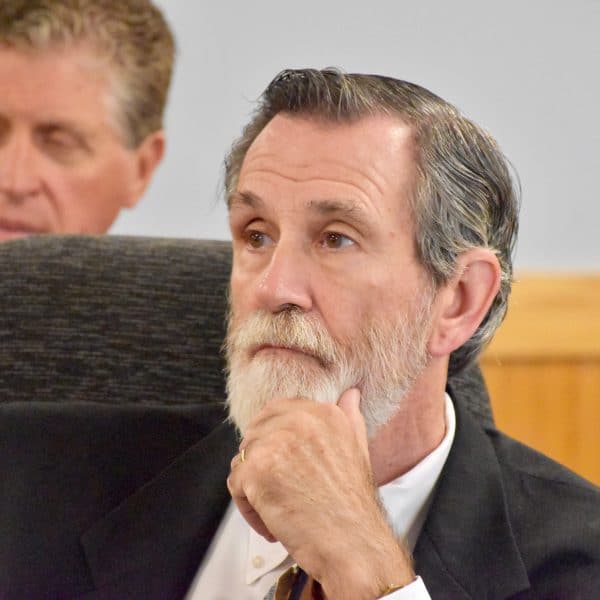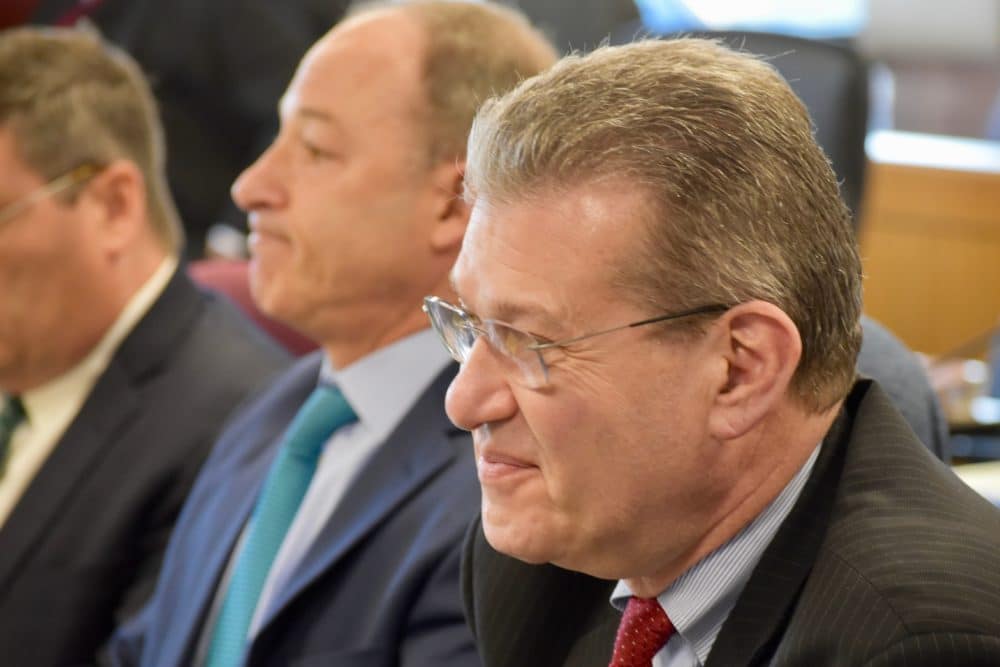Invenergy’s final argument to the EFSB is kind of a mess…
Invenergy, the company that seeks to build a $1 billion fracked gas and diesel oil burning power plant amidst the irreplaceable forests of northwest Rhode Island, faced a problem when it began writing its Post Hearing Memorandum, filed on Friday with the Energy Facilities Siting Board (EFSB). The Problem? Their proposed power plant is not needed. In order to receive
May 18, 2019, 1:53 pm
By Steve Ahlquist
Invenergy, the company that seeks to build a $1 billion fracked gas and diesel oil burning power plant amidst the irreplaceable forests of northwest Rhode Island, faced a problem when it began writing its Post Hearing Memorandum, filed on Friday with the Energy Facilities Siting Board (EFSB).
The Problem? Their proposed power plant is not needed.
In order to receive a license to build their power plant from the EFSB, Invenergy has to demonstrate to the EFSB that the plant will save ratepayers money, that the plant will not cause irreparable harm to the environment, and that the plant is needed to keep the lights on in Rhode Island. In Invenergy’s Post Hearing Memorandum, which you can think of as their final argument, the company ran into a big problem: ISO New England, which oversees the power grid in New England and holds periodic auctions that determine the price of electricity throughout the region, has quite clearly decided that the power plant is not needed.
ISO actions, such as terminating Invenergy’s CSO; ISO forecasts, that show demand declining and available capacity increasing and ISO documents, that show no need for Invenergy’s proposed power plant, are tremendous hurdles to overcome in trying to convince EFSB boardmembers that the plant is somehow needed.
Glossary:
- ISO – ISO New England, which oversees thw power grid in New England and holds periodic auctions that determine the price of electricity throughout the region.
- FCA – Forward Capacity Auction – Held every year, prospective power providers bid into the auction and promise to deliver power at a pre-determined price three years later on demand from the ISO. FCAs are number FCA-1, FCA 2, etc. FCA-1 is the most recent, FCA-14 will be held this winter.
- CSO – Capacity Supply Obligation – Power providers who successfully compete in a Forward Capacity Auction are granted CSOs. These are contractual agreements to provide power at the price determined in the auction when needed.
- FERC – The Federal Energy regulatory Commission -The Federal agency that oversees power generation throughout the United States.
- DEM – The Rhode Island Department of Environmental Management – The State agency that oversees the natural environment in Rhode Island.
- TNC – The Nature Conservancy – and environmental organization that does on the ground science for threatened ecosystems.
Instead of directly addressing this issue of need and ISO New England, Invenergy avoided it by claiming that the Rhode Island Division of Planning is the agency that does long-range planning of energy needs.

Not only are energy markets are not planned or run by the Rhode Island Division of Planning, this new assertion is a complete change of direction for Invenergy, whose lawyers and experts spent years telling the EFSB and the public that that ISO New England’s interest in the power the company might supply is proof that the plant is needed.
In Burrillville’s Post Hearing Memorandum, Burrillville’s Attorney Michael McElroy writes:
“Until Invenergy lost the Unit 1 CSO in 2018, Invenergy consistently and repeatedly argued that because ISO awarded Invenergy a CSO of 485 MWs for Unit 1, the proposed [power plant] was needed. Now, however, after ISO took the unprecedented step of terminating Invenergy’s CSO for Unit 1, Invenergy has been expending much effort to distance itself from its earlier assertions that equated having a CSO with need for CREC.” [page 13, emphasis mine]
McElroy goes on to list eight instances in which Invenergy claimed that having a CSO shows a need for their proposed power plant. [page 14, emphasis mine]
- “Why is the forward capacity market the appropriate mechanism to determine the need for Clear River? [. . .] The FCM is the competitive free market mechanism that determines need for new power generating units in ISO-NE.” (Ryan Hardy; PUC Rebuttal Testimony).
- “Is the FCM the free market mechanism that determines the need for new generating units in ISO-NE? Yes.” (Ryan Hardy; PUC Rebuttal Testimony).
- “Clearing an FCA determines that a facility is needed by ISO-NE to maintain reliability for that delivery year.” (Ryan Hardy; PUC Rebuttal Testimony).
- “By clearing the auction, [Invenergy’s proposed power plant] was determined by the free market to be needed. Moreover, ISO-NE explicitly stated after FCA 10 that the new resources that cleared FCA 10 are needed. In its press release following the auction, ISO-NE affirmed that FCA 10 ‘provided the incentives for developers to bring new – and needed – resources to the market.’” (Ryan Hardy; PUC Rebuttal Testimony).
- “. . . all cleared capacity in an FCA is needed by ISO-NE . . .” (Ryan Hardy; PUC Rebuttal Testimony).
- “The ISO-NE has determined that [Invenergy’s proposed power plant] is needed to meet the reliability needs of the region by awarding a [CSO] in its recent competitive wholesale capacity auction.” (Invenergy Post-Hearing Memorandum).
- “Invenergy was recently awarded a CSO for 485 MWs in FCA-10. The award of a CSO by itself is compelling evidence of need.” (Invenergy Post-Hearing Memorandum).
- “Seth Parker testified that ‘if [Invenergy’s proposed power plant] clears in future FCAs and is awarded CSOs, it will be needed. If [Invenergy’s proposed power plant] fails to get a CSO in the future, it will not be needed . . .” (Invenergy Post-Hearing Memorandum).
McElroy writes:
“Now that it has lost the CSO for Unit 1, Invenergy has changed its argument: ‘…whether or not we have a CSO … we don’t believe it’s relevant.” ([Invenergy Attorney Michael Blazer responding to a question from the Chairperson)
“If, as Invenergy so fervently argued, the award of the CSO by ISO was strong evidence of need for CREC, then the termination of the CSO by ISO is strong evidence of lack of need. [emphasis mine]”
Jerry Elmer, Senior Attorney at Conservation Law Foundation (CLF), who, along with McElroy has been fighting the proposed power plant before the EFSB for nearly four years, told me that, “Invenergy seems to have forgotten that the EFSB members were actually present for Invenergy’s testimony. Invenergy’s silence in its brief on ISO markets and forecasts will be stunningly obvious to everyone who has been following the case.
“The weakness of Invenergy’s brief on the major, central issue of need should be very reassuring to all opponents of the power plant,” continued Elmer. “Both CLF’s brief and Burrillville’s brief use ISO markets, ISO actions, and ISO forecasts to show that Invenergy is not needed. Invenergy’s brief virtually ignores the ISO. This omission by Invenergy will leap off the page to the members of the EFSB.”
I mentioned in my overview of the CLF Post-Hearing Memorandum that Invenergy has a difficult time with the truth. In the CLF Post-Hearing Memorandum, Attorney Elmer listed “at least five instances of Invenergy misstatements, mistruths, and lack of candor.”
Weirdly, Invenergy decided to draw attention to CLF’s assertions that they cannot be trusted to tell the truth in their Post-Hearing Memorandum, writing,
“Turning to the issue of credibility, CLF in its opening statement asserted that it would ‘put into the record… facts that show that Invenergy has lied to the EFSB, lied to ISO New England and lied to the public…’ ‘Lie’ is a strong word to use before any tribunal, particularly since these assertions turned out to be nothing more than CLF’s misreadings and misinterpretations. Nothing untoward materialized from CLF’s cross-examination of Invenergy’s witnesses on issues CLF had indicated were critical, such as air emissions and flow blocking of habitat. Simply stated, CLF failed to provide this Board with any evidence to support its assertions.” [page 4]
A cursory read of the CLF Post-Hearing Memorandum shows that CLF did in fact supply plenty of evidence regarding Invenergy’s “misstatements, mistruths, and lack of candor.” Invenergy did not take the time to refute CLF on this point and offered no evidence in their own defense. They simply deny the existence of their “misstatements, mistruths, and lack of candor,” believing this to be a satisfactory defense.
“If I were Invenergy, I would not have done that,” said CLF Attorney Jerry Elmer. “CLF did make a showing of Invenergy’s dishonesty with the EFSB and the public. Invenergy should not have highlighted that fact.”
One other aspect of the brief Attorney Elmer pointed out to me was about Invenergy’s witness on air emissions, Ryan Hardy. On page 4, footnote 7, Invenergy writes, “CLF filed a motion to strike Mr Ryan Hardy’s air emissions testimony, arguing that there was no basis for his testimony because Invenergy no longer had a capacity supply obligation (CSO) for Unit 1. In denying the motion, the Board noted that CLF could cross-examine Mr Hardy on the subject when he testified again in January 2019… CLF did not in fact conduct any follow-up cross-examination on that point and, despite asserting that it would file a renewed motion to strike Mr Hardy’s testimony, CLF did not do that either.”
Elmer explains:
“Invenergy criticizes CLF by saying that we completely failed to make good on our promise to show that Ryan Hardy’s testimony on air emissions was badly grounded and should not be believed. However, CLF did exactly what we promised we would do – this appears in CLF’s Post-Hearing Memorandum starting in the middle of page 24 and running through the middle of page 26.
“There is a very amusing aspect to this: The reason that CLF was able to get this into the Record of the case was that Ryan Hardy was completely unfamiliar with the offer-price mitigation role of the ISO’s Internal Market Monitor (IMM),” explained Elmer. “Because Hardy was ignorant of this important point, he could not (and did not) account for it in calculating how many hours a year the plant would be running without having a CSO. Thus, Hardy’s air emissions calculations (including, but not limited to, carbon) were all wrong.
“[In Invenergy’s Post-Hearing Memorandum], we find out that Invenergy’s lawyers are also blissfully ignorant of what the IMM does and how that affects the ISO’s economic-dispatch algorithms! In its brief, Invenergy inaccurately says that CLF failed to make this point. In fact, CLF not only made the point, but documented it in our brief. Invenergy didn’t have the knowledge of the markets to even see that argument had been made,” said Elmer.
“Invenergy’s display of ignorance is amusing.”
UpriseRI is entirely supported by donations and advertising. Every little bit helps:
Become a Patron!






